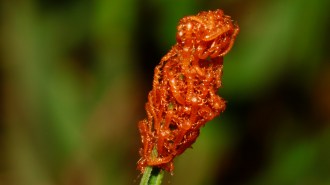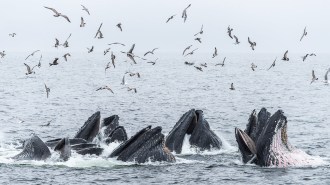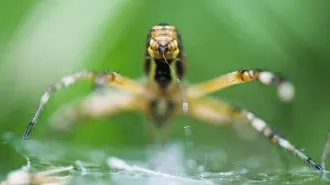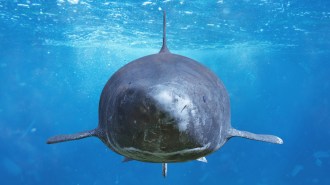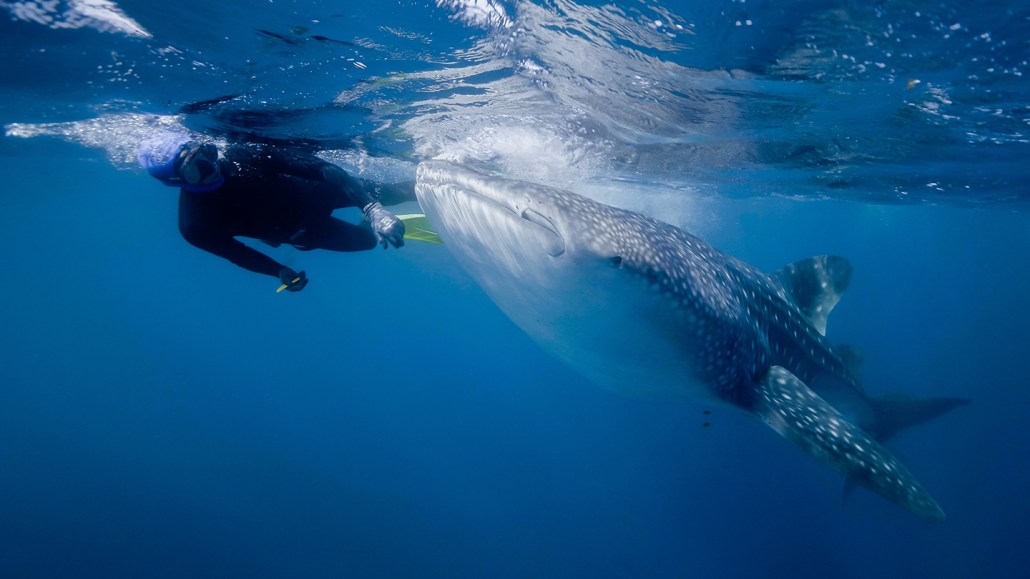
Tropical fish biologist Mark Meekan (pictured) and colleagues got up close and personal with whale sharks (one shown) off the coast of Australia, taking tissue samples in a bid to uncover what these ocean giants eat.
Andre Rerekura/AIMS
By Freda Kreier
- More than 2 years ago
Read another version of this article at Science News Explores
As Mark Meekan bobbed among swells in the Indian Ocean, he spotted a giant shadowy figure moving through the water. The tropical fish biologist dove to meet the gentle giant — a whale shark — and took some samples of its skin. Swimming alongside these aquatic giants is nothing new for Meekan, who works at the Australian Institute of Marine Science in Perth. But “having an encounter with something that feels like it’s from prehistory is an experience that never gets old,” he says.
Averaging around 12 meters long, the whale shark (Rhincodon typus) is the largest living fish species on Earth and among the most mysterious. Since these sharks spend the majority of their lives in the deep ocean, Meekan says, analyzing the chemical makeup of their tissues can be hugely powerful for learning more about the animals’ fundamental biology (SN: 7/14/20) and behavior — including what they like to eat.
The skin samples that Meekan and colleagues collected and analyzed reveal that whale sharks, long thought to be strict meat-eaters, also eat and digest algae. The findings, described July 19 in Ecology, add to a growing body of evidence that whale sharks deliberately eat plants, making them the largest omnivores on Earth. The previous record-holder, the Kodiak brown bear (Ursus arctos middendorffi), averages about 2.5 meters in length.
Algae has turned up before in the stomachs of beached whale sharks. But because of how whale sharks feed — by swimming mouth-open through swarms of zooplankton — “everyone though it was just accidental ingestion,” Meekan says. Carnivores typically can’t digest plant life, so some scientists suspected that algae passed through whale sharks’ guts without being digested.
To find out if that assumption held up, Meekan and colleagues followed whale sharks as the fish gathered near Ningaloo reef off the coast of Western Australia in 2017. Since the gigantic fish are well camouflaged from the sea surface, the team located 17 individuals that had surfaced to feed from an airplane. They then intercepted the sharks by boat and jumped into the water to snap pictures, scrape off parasites and collect tissue samples.
Meekan says most whale sharks don’t react when they get jabbed by the spear, which is roughly the width of a pinky finger. Some even seem to enjoy attention from researchers, he says. It’s as though they think: “This isn’t threatening. In fact, I quite like that.”
The whale sharks at Ningaloo reef were rich in arachidonic acid, an organic molecule found in brown algae called sargassum, the analysis showed. Since the sharks can’t make this molecule themselves, they probably got it by digesting algae, Meekan says. It’s not yet clear how arachidonic acid affects whale sharks.
The new work supports previous research by an independent group that found plant nutrients in the skin of whale sharks off the coast of Japan. Taken together, the findings suggest that digesting greens is common practice for whale sharks.
But that doesn’t mean that whale sharks are true omnivores, says shark biologist Robert Hueter of Mote Marine Laboratory in Sarasota, Florida. “Whale sharks take in a lot of other things than the food they’re targeting,” he says. “This is a bit like saying that cows are omnivores because they eat insects while feeding on grass.”
While Meekan admits that he can’t say for certain that whale sharks specifically seek out sargassum, the amount they eat isn’t incidental either. His team’s analysis clearly shows, he says, that plant material in fact makes up a very large part of their diet. It’s so large, he notes, that whale sharks and the zooplankton that they also eat seem to occupy similar rungs on the marine food chain, both just one rung above the phytoplankton they both feast upon.
Regardless of whether whale sharks actively seek out plant snacks, the animals do have the ability to digest them, Meekan says. “We don’t see whale sharks that often, but their tissues hold a remarkable record of what they’ve been up to,” he says. “We’re now learning how to read this library.”



